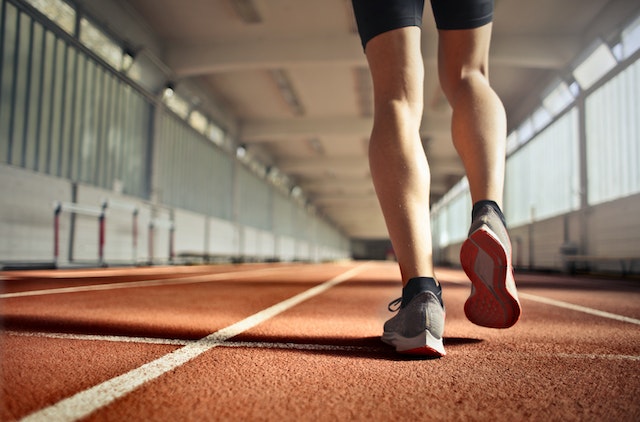
Whatever the reason, all cramps happen in the same way. You may be exercising or you may be at rest, but your muscle will suddenly and involuntarily contract. This can be extremely painful and alarming. The only thing you can do is to wait it out or to try and break the cramp by stretching the muscle in the opposite direction. For example, if your calf muscle is cramping, you can lift your toes to stretch the muscle and this will break the cramp. Cramps are most common in the leg muscles, and most commonly in the calf.
When your muscle cramps, it is because the motor nerves in your peripheral nervous system go haywire and fire at an extremely high rate. The motor nerves are the ones that we use when we are walking or standing. They are nerves that send signals automatically and that we don’t need to think about. The motor nerves make your leg muscles contract and relax every few seconds as you are walking, and in microsecond increments when you are just standing and need to balance. The motor nerves are very sensitive and sometimes they can go off for no reason, causing a cramp. When people who are having cramps are tested, these motor nerves are firing like crazy, contracting the muscle.
So, why do they happen. Not every cramp is the same and there are many possible causes. Over using or over exerting a muscle is one thing that can cause a cramp. The muscles become fatigued and more likely to cramp. Obviously, not every tired muscle cramps, but cramps are more common in people with tired muscles. Cramps are more common in the last stages of a marathon race, but only a very few people actually get cramp. The reasons for this are not known, but it is possibily that the muscle is dehydrated. When our nerves want to make a muscle contract they send the signal by opening tiny holes that let salt move in and out of cells. The muscles open and close their own salt gates to contract and relax. By opening and closing these salt gates, they can create an electrical charge which sends the signal and moves the muscles. If a person is dehydrated, the amount of water and salt in the body changes, which could stop the muscles from being able to relax. However, there is no actual evidence for the dehydration theory. There is a lot of anecdotal evidence, but no real evidence.
It could also be caused by a lack of salt. This is very closely connected to the dehydration theory. It is not that people don’t eat enough salt as it is that they sweat out the salt when they are exercising or working in a hot place. It stands to reason that if you are dehydrated, you are also lacking salt. And if you don’t have enough salt in your system, the muscles can’t send and receive their signals. However, experiments showed that athletes in hot countries were no more likely to get cramp than athletes in cold countries, so dehydration and a lack of salt are problem not the reason. They may have a part to play, but it is more likely something else. It is possible that it is neurological and the motor neurons just go crazy when they are fatigued, but if that were the case, surely cramp would always happen when muscles get tired.
There is another type of cramp that happens when people are sleeping. If you have experienced this, it is so painful it can actually wake you up. This kind of cramp can become more common as people age. It is possibly caused by a reduced blood flow to the muscles. When people, especially elderly people, are asleep, blood can have trouble reaching muscles, possibly due to the narrowing of the arteries that occurs with age. These cramps could also be caused by a loss of muscle mass, also because of age. A loss of muscle mass can put more strain on the muscles, inducing a cramp. They could also be caused by the legs being in an odd position during sleep. A cramp might happen if the toes are extended during sleep.
Cramps can also be a side effect of medication, or they could be caused by liver disease or other diseases. There are many different types of cramp and no one knows the real reason why they occur. If it were simply dehydration, lack of salt, or narrowed veins, then everybody in those situations would develop cramp, which clearly doesn’t happen. Nobody can explain why it happens. And this is what I learned today.
Photo by Andrea Piacquadio: https://www.pexels.com/photo/fit-athlete-during-training-on-running-track-3756042/
Sources
https://www.bbc.com/future/article/20120430-are-cramps-due-to-lack-of-salt
https://www.drinkhydrant.com/blogs/news/does-dehydration-cause-leg-cramps
https://www.ncbi.nlm.nih.gov/pmc/articles/PMC6407543/
https://www.ncbi.nlm.nih.gov/pmc/articles/PMC6901412/
https://www.bupa.co.uk/health-information/exercise-fitness/exercise-muscle-cramps
https://en.wikipedia.org/wiki/Cramp
https://my.clevelandclinic.org/health/symptoms/21190-muscle-cramps
https://www.health.harvard.edu/staying-healthy/take-that-muscle-cramps
https://my.clevelandclinic.org/health/body/23123-peripheral-nervous-system-pns
https://my.clevelandclinic.org/health/diseases/15466-muscle-spasms
